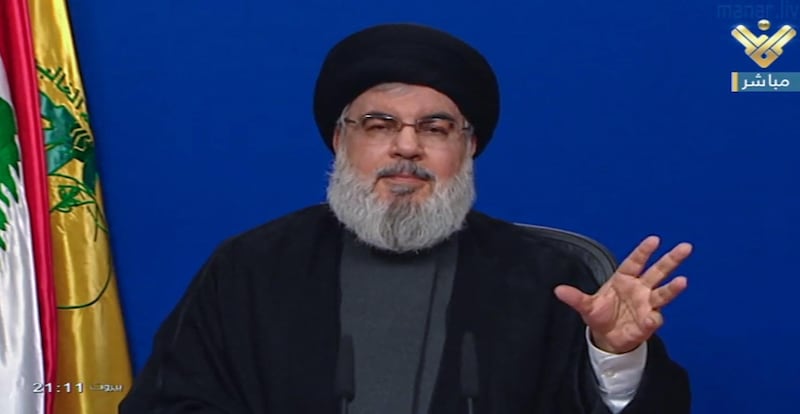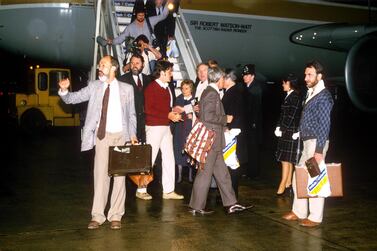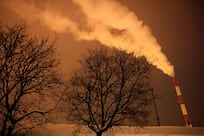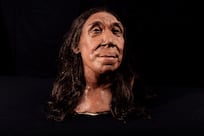Hezbollah leader Hassan Nasrallah on Friday stressed that his party had no knowledge of any Lebanese-American deal to release former Israeli collaborator Amer Fakhoury from detention and that this was proof that his party did not control Lebanon.
“We have no knowledge of a deal to release Amer Fakhoury and what we know is that there was no deal,” Mr Nasrallah said in a defensive televised address that lasted over an hour.
“From the first moment after Fakhoury’s release, a broad campaign was launched against the Shiite duo,” he lamented, referring to Hezbollah and its Lebanese Shiite Muslim ally, Amal.
Mr Nasrallah added: “Ever since Fakhoury was arrested six months ago, the US started exerting strong pressures on the Lebanese state to resolve this issue and release this collaborator without any conditions.”
In a spectacular exit, Mr Fakhoury, 57, was spirited out of the country on Thursday in a US military helicopter that picked him up from the US embassy outside Beirut.
Much to Hezbollah's dismay, this occurred despite the closure of Lebanon’s borders over fears of the spread of the coronavirus and the issuance of a two month travel ban against Mr Fakhoury by a Lebanese judge on Tuesday.
Foreign Minister Nasif Hitti has sought an explanation of Mr Fakhoury’s departure from US Ambassador Dorothy Shea, Lebanon’s official National News Agency said.
Mr Fakhoury had been released on Monday after spending six months in detention.
Lebanon’s military tribunal ruled that too much time had passed since Mr Fakhoury’s alleged crimes of torture and murder in the 1990s, when he was a senior warden at Khiam prison in South Lebanon, which was at the time under Israeli occupation (1982-2000).
The detention centre, where thousands of Lebanese were tortured and imprisoned outside of any legal framework, was run by the South Lebanon Army, a local militia that cooperated with Israel in fighting Hezbollah and its allies.
When Israel withdrew, many SLA members, including Mr Fakhoury, fled to Israel. He then settled in the US, where he opened a restaurant, and was arrested a few days after his return to Lebanon on September 12 on a family visit.
“We wanted justice for those who had been oppressed,” said Mr Nasrallah. “Instead of being directed at the US, anger has been directed at the victim.”
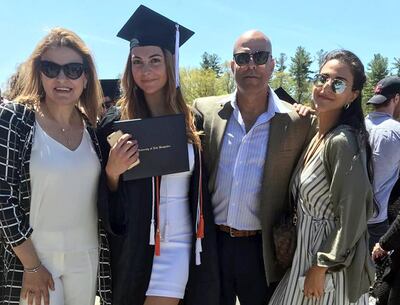
Commenting on social media posts criticising Hezbollah for Mr Fakhoury’s departure from the country, Mr Nasrallah said that “some say that it is not possible that Amal and Hezbollah did not know what happened, but we do not know about many decisions of the Military Tribunal and the security apparatus.”
Noting that Hezbollah had rejected Mr Fakhoury’s release when asked about the case by certain political parties, Hezbollah’s leader slammed the move as “a dangerous development that will allow Americans to impose what they want in the future”.
“We thought that no such ruling would be issued and that the court would not convene amid the current circumstances, but we learned of the collaborator's release from media outlets,” he said.
Mr Nasrallah also revealed that “direct threats were made as to placing some individuals on the sanctions list, halting aid to the Lebanese Army, slapping economic sanctions and preventing world nations from offering assistance to the Lebanese state”.
“A lot of pressures were exerted on the judges and there are judges who issued a travel ban and others who submitted and issued a release order,” he said.
Mr Nasrallah pointed out that the Lebanese judiciary resisted to US pressures for six months when other countries in the region would have caved in within a few hours or days.
He stressed that Hezbollah “did not face any pressure at all from any political party in Lebanon regarding Fakhoury’s case.”
“The government has never been Hezbollah’s government, the state has never been Hezbollah’s state and there are parties who have more influence on the domestic political equation,” Nasrallah added.
Hebzollah critics, including Israeli hawks, argue that Lebanon and its army are controlled by Hezbollah to discourage international aid.
Addressing critics, Mr Nasrallah wondered whether Hezbollah was supposed to “set up an ambush against the Lebanese Army and the forces tasked with protecting Fakhoury.”
“Was Hezbollah supposed to shoot down the aircraft that carried Fakhoury? Is this in the interest of the country and the government?” he asked.
“Is it right to topple the government amid these circumstances for the sake of Fakhoury?” Hezbollah’s secretary-general added.
“How can we ask people in the era of coronavirus to demonstrate and storm the US embassy? How can we subject them to dangers?” he went on to say.
Noting that Mr Fakhoury’s arrival in the US should not necessarily stand for the end of the case, Mr Nasrallah said the file should be followed up by the Lebanese judiciary, describing Mr Fakhoury as a “fugitive.”
He called for an investigation into the team at the military tribunal which ordered Mr Fakhoury’s release. On Friday morning, the tribunal’s head, Hussein Abdallah, resigned “out of respect” for [his] oath and military honor.”
Addressing some “friends and allies,” Mr Nasrallah added: “We have swallowed the harm and insults but from now on, we in Hezbollah will not allow a friend or ally to accuse, insult or launch treason accusations against it. They better stop being our friends.”
Outside Amal, Hezbollah’s main alliance is with President Michel Aoun’s Christian party, the Free Patriotic Movement.
Turning to the coronavirus crisis and Lebanon’s measures to confront it, Mr Nasrallah repeatedly said that it is “shameful” to deal with the issue in a “sectarian” manner.
“The government should isolate any region it wants even if it's a Shiite region,” he suggested.
An uproar had erupted after Health Minister Hamad Hasan revealed that he had asked the government to “isolate two regions” over a rise in coronavirus cases in them.
Mr Nasrallah also noted that all of Hezbollah members who go to Syria or Iran are being subjected to “coronavirus tests and home isolation.”
